40.2.3.4.6 (40 > 52)
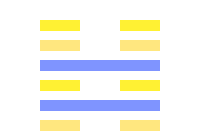
40.2.3.4.6 (40 > 52) - THE KIEH HEXAGRAM.
- 2. The second line, undivided, shows its subject catch, in hunting, three foxes, and obtain the yellow ( = golden) arrows. With firm correctness there will be good fortune.
- 3. The third line, divided, shows a porter with his burden, (yet) riding in a carriage. He will (only) tempt robbers to attack him. However firm and correct he may (try to) be, there will be cause for regret.
- 4. (To the subject of) the fourth line, undivided, (it is said), ‘Remove your toes. Friends will (then) come, between you and whom there will be mutual confidence.’
- 6. In the sixth line, divided, we see a feudal prince (with his bow) shooting at a falcon on the top of a high wall, and hitting it. (The effect of his action) will be in every way advantageous.
40.2.3.4.6 (40 > 52) - Being encouraged to continue
One makes another attempt because the others want one to get there.
Bing DeepL Google Yandex40.2.3.4.6 (40 > 52) - Being encouraged to continue
One makes another attempt because the others want one to get there.
Bing DeepL Google Yandex40.2.3.4.6 (40 > 52) - Kieh, la libération
Kieh : 1. Délivrer, faire échapper, échapper au danger ; 2. Disperser ; 3. Ouvrir, séparer, s’ouvrir. Se dit du mouvement de la germination. 4. Résoudre une difficulté, une complication.
- 2. Délivrer est aussi heureux que, pour le chasseur, prendre trois renards et obtenir le prix, la flèche d’or. — Celui qui résout une difficulté, fait sortir d’une position difficile, est comme le chasseur qui prend trois renards et obtient la flèche d’or.
-
3. Si un porteur se met dans un char et qu’il survienne des voleurs, il sera attaqué et échappera difficilement ; s’il abandonne sa charge, il pourra se sauver.
Pour un porteur, aller en char est honteux ; c’est attirer sur soi les voleurs.
Il n’appartient pas à des gens du commun d’aller en char . -
4. Échappez d’abord et après cela les amis viendront témoigner leur fidélité (sinon ils vous abandonnent).
Note. Le mot qui signifie ordinairement gros orteil est expliqué par les commentateurs comme ayant ici le sens de tchū, commencement, d’abord - 6. Si le prince est assez habile pour atteindre d’une flèche un faucon posé sur le haut d’un mur élevé, il aura le succès et saura disperser les rebelles.
40.2.3.4.6 (40 > 52) - Être encouragé à persévérer
On fait une tentative supplémentaire car les autres veulent qu'on y arrive.
Bing DeepL Google Yandex40.2.3.4.6 (40 > 52) - Módosítás
- 2. Megkérik hogy válaszokat keressen mielőtt túl késő.
- 3. Ha valaki elhanyagolja, másoknak adja.
- 4. Ajtók fognak megnyílni ha valaki felhagy a felesleges kényelemkereséssel.
- 6. Miután felkészül, meg tudja oldani a problémákat időben.
The trigrams
The trigrams are combinations of three yin and yang lines. The three bottom lines of the hexagram form the lower trigram and represent the inner situation. The three top lines form the upper trigram and represent the outer situation.
Upper trigram: The thunder The mountain


Lower trigram: The water The mountain


The formation: 40
What is already there
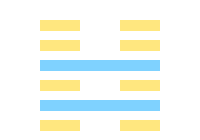
40 - THE KIEH HEXAGRAM.
In (the state indicated by) Kieh advantage will be found in the south-west. If no (further) operations be called for, there will be good fortune in coming back(to the old conditions). If some operations be called for, there will be good fortune in the early conducting of them.
Bing DeepL Google Yandex40 - Kieh, la libération
Kieh : 1. Délivrer, faire échapper, échapper au danger ; 2. Disperser ; 3. Ouvrir, séparer, s’ouvrir. Se dit du mouvement de la germination. 4. Résoudre une difficulté, une complication.
Texte et commentaire
Si l’on réussit à faire échapper aux dangers, on gagnera les gens à soi et l’on aura des relations heureuses ; on gardera le milieu. En tout ce que l’on fait, l’activité est chose utile et fait acquérir des mérites. Kieh est : se trouvant en danger, savoir agir et échapper. Quand le ciel et la terre ouvrent les pores (3e sens) des êtres, le tonnerre et la pluie se produisent. Alors les plantes et les arbres à fruit bourgeonnent. Bien important est le temps où tout s’ouvre.
Symbolisme
Le tonnerre et la pluie forment le Koua Kieh. Le sage est indulgent pour l’erreur et traite les coupables avec douceur.
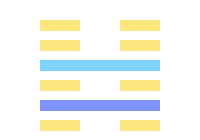
40.2 (40 > 16) - THE KIEH HEXAGRAM.
The second line, undivided, shows its subject catch, in hunting, three foxes, and obtain the yellow ( = golden) arrows. With firm correctness there will be good fortune.
Bing DeepL Google Yandex40.2 (40 > 16) - Defending one's rights
One is asked to find the answers before it is too late.
Bing DeepL Google Yandex40.2 (40 > 16) - Defending one's rights
One is asked to find the answers before it is too late.
Bing DeepL Google Yandex40.2 (40 > 16) - Kieh, la libération
Kieh : 1. Délivrer, faire échapper, échapper au danger ; 2. Disperser ; 3. Ouvrir, séparer, s’ouvrir. Se dit du mouvement de la germination. 4. Résoudre une difficulté, une complication.
Délivrer est aussi heureux que, pour le chasseur, prendre trois renards et obtenir le prix, la flèche d’or. — Celui qui résout une difficulté, fait sortir d’une position difficile, est comme le chasseur qui prend trois renards et obtient la flèche d’or.
Bing DeepL Google Yandex40.2 (40 > 16) - Défendre ses droits
On nous demande de trouver les réponses avant qu'il ne soit trop tard.
Bing DeepL Google Yandex40.2 (40 > 16) - Módosítás
Megkérik hogy válaszokat keressen mielőtt túl késő.
Bing DeepL Google Yandex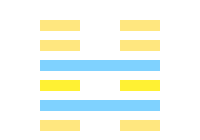
40.3 (40 > 32) - THE KIEH HEXAGRAM.
The third line, divided, shows a porter with his burden, (yet) riding in a carriage. He will (only) tempt robbers to attack him. However firm and correct he may (try to) be, there will be cause for regret.
Bing DeepL Google Yandex40.3 (40 > 32) - Forgiving slight mistakes
When one neglects, one gives to others.
Bing DeepL Google Yandex40.3 (40 > 32) - Forgiving slight mistakes
When one neglects, one gives to others.
Bing DeepL Google Yandex40.3 (40 > 32) - Kieh, la libération
Kieh : 1. Délivrer, faire échapper, échapper au danger ; 2. Disperser ; 3. Ouvrir, séparer, s’ouvrir. Se dit du mouvement de la germination. 4. Résoudre une difficulté, une complication.
Si un porteur se met dans un char et qu’il survienne des voleurs, il sera attaqué et échappera difficilement ; s’il abandonne sa charge, il pourra se sauver.
Pour un porteur, aller en char est honteux ; c’est attirer sur soi les voleurs.
Il n’appartient pas à des gens du commun d’aller en char .
40.3 (40 > 32) - Pardonner les fautes légères
Quand on néglige on donne aux autres.
Bing DeepL Google Yandex
40.4 (40 > 7) - THE KIEH HEXAGRAM.
(To the subject of) the fourth line, undivided, (it is said), ‘Remove your toes. Friends will (then) come, between you and whom there will be mutual confidence.’
Bing DeepL Google Yandex40.4 (40 > 7) - Getting rid of a friend who has become embarrassing
Doors will open if one deviates from an unnecessary convenience.
Bing DeepL Google Yandex40.4 (40 > 7) - Getting rid of a friend who has become embarrassing
Doors will open if one deviates from an unnecessary convenience.
Bing DeepL Google Yandex40.4 (40 > 7) - Kieh, la libération
Kieh : 1. Délivrer, faire échapper, échapper au danger ; 2. Disperser ; 3. Ouvrir, séparer, s’ouvrir. Se dit du mouvement de la germination. 4. Résoudre une difficulté, une complication.
Échappez d’abord et après cela les amis viendront témoigner leur fidélité (sinon ils vous abandonnent).
Note. Le mot qui signifie ordinairement gros orteil est expliqué par les commentateurs comme ayant ici le sens de tchū, commencement, d’abord
40.4 (40 > 7) - Se débarrasser d'un ami devenu gênant
Des portes s'ouvriront si l'on s'écarte d'une commodité superflue.
Bing DeepL Google Yandex40.4 (40 > 7) - Módosítás
Ajtók fognak megnyílni ha valaki felhagy a felesleges kényelemkereséssel.
Bing DeepL Google Yandex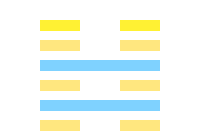
40.6 (40 > 64) - THE KIEH HEXAGRAM.
In the sixth line, divided, we see a feudal prince (with his bow) shooting at a falcon on the top of a high wall, and hitting it. (The effect of his action) will be in every way advantageous.
Bing DeepL Google Yandex40.6 (40 > 64) - Unlocking the situation
Once prepared, one can solve problems in time.
Bing DeepL Google Yandex40.6 (40 > 64) - Unlocking the situation
Once prepared, one can solve problems in time.
Bing DeepL Google Yandex40.6 (40 > 64) - Kieh, la libération
Kieh : 1. Délivrer, faire échapper, échapper au danger ; 2. Disperser ; 3. Ouvrir, séparer, s’ouvrir. Se dit du mouvement de la germination. 4. Résoudre une difficulté, une complication.
Si le prince est assez habile pour atteindre d’une flèche un faucon posé sur le haut d’un mur élevé, il aura le succès et saura disperser les rebelles.
Bing DeepL Google Yandex40.6 (40 > 64) - Débloquer la situation
Après s'être préparé, on peut résoudre les problèmes à temps.
Bing DeepL Google Yandex40.6 (40 > 64) - Módosítás
Miután felkészül, meg tudja oldani a problémákat időben.
Bing DeepL Google YandexIn the making: 52
What is poised to happen

52 - THE KĂN HEXAGRAM.
When one's resting is like that of the back, and he loses all consciousness of self; when he walks in his courtyard, and does not see any (of the persons) in it, there will be no error.
Bing DeepL Google Yandex52 - Stop
One recognizes that it is time to stop because one needs to feed oneself.
Bing DeepL Google Yandex52 - Stop
One recognizes that it is time to stop because one needs to feed oneself.
Bing DeepL Google Yandex52 - Kán, l’arrêt
Kán : ferme, tenir droit, bien réglé, arrêter, reposer
Kan « ferme ». L’homme ferme tourne le dos et s’oppose résolument, sans tenir compte de lui-même. S’il traverse un endroit, il ne regarde pas qui y est et ne faillit point.
Texte
L’homme ferme s’oppose résolument (au mal) sans tenir compte de lui-même. Devant traverser un endroit, il ne regarde pas qui s’y trouve (mais le fait résolument) et ne faillit point.
Symbolisme
Deux montagnes superposées forment le Koua. Ainsi l’homme supérieur pense à ne pas dépasser les bornes de ses fonctions.
Commentaire
Kán signifie s’arrêter, tenir ferme, en bon ordre, agir ou s’arrêter selon l’occasion. Quand l’acte et sa cessation ont lieu en temps convenable, la conduite est belle et intelligente. « Rester à sa place », cela veut dire que les grands et les petits sont en rapport, mais sans usurpation ni entre-croisement. Celui qui est ferme et attentif à son devoir ne se recherche pas lui-même. Marchant dans son jardin, il ne voit pas même qui s’y trouve.
Note. Tout ceci illustre le sens « tenir droit, bien réglé » et se réfère aux rites du maintien extérieur qui prescrivent de se tenir toujours droit et de ne pas même s’asseoir sur un siège qui n’est pas droit.
52 - Cesser
On reconnaît qu'il est temps de s'arrêter car on a besoin de s'alimenter.
Bing DeepL Google Yandex52 - Megállás
Felismeri hogy itt az ideje megállni mert a többieket táplálni kell.
Bing DeepL Google YandexThe nuclear hexagram: 63.1.2.3.4.5 (63 > 40)
The nuclear hexagram is the association of the two inner trigrams (lines 2,3,4 and 3,4,5). It represents the root, or the origin of the situation.

63.1.2.3.4.5 (63 > 40) - THE KÎ 3Î HEXAGRAM.
- 1. The first line, undivided, (shows its subject as a driver) who drags back his wheel, (or as a fox) which has wet his tail. There will be no error.
- 2. The second line, divided, (shows its subject as) a wife who has lost her (carriage-)screen. There is no occasion to go in pursuit of it. In seven days she will find it.
- 3. The third line, undivided, (suggests the case of) Kao 3ung who attacked the Demon region, but was three years in subduing it. Small men should not be employed (in such enterprises).
- 4. The fourth line, divided, shows its subject with rags provided against any leak (in his boat), and on his guard all day long.
- 5. The fifth line, undivided, shows its subject (as) the neighbour in the east who slaughters an ox (for his sacrifice) ; but this is not equal to the (small) spring sacrifice of the neighbour in the west, whose sincerity receives the blessing.
63.1.2.3.4.5 (63 > 40) - Tchi tzi, ce qui suit l’achèvement
Tchi-tzi : traversée achevée, achèvement, succès, moyen d’achever, compléter.
- 1. Traversée achevée comme celle de quelqu’un qui, ayant fini son voyage, reprend les roues de son char, ou d’un renard qui, tout en traversant une rivière, a mouillé sa queue complètement.
-
2. Voyage fini (interrompu), comme d’une femme qui, ayant perdu le voile de son char (Keū tchi pi, tenture qui entourait le char et cachait la personne qui le montait. Sans ce voile, une femme vertueuse ne pouvait voyager. Son voyage était donc fini jusqu’à ce qu’elle le retrouve et elle ne pouvait aller à découvert pour le chercher) ne peut le chercher, mais le retrouve seulement après quelques (sept) jours.
Elle agit ainsi parce qu’elle suit la voie de la sagesse. -
3. Expédition achevée. — Kao-tsong (empereur de la dynastie Shang ; régnait vers 1300 et resta cinquante-neuf ans sur le trône. Les démons dont il s’agit sont les aborigènes insoumis et déprédateurs) attaqua la région des démons et, en trois ans, acheva son triomphe. Un prince vulgaire n’eût pu le faire.
Il eut beaucoup de peine. -
4. Lorsque les bords, les franges d’un habit se mouillent, il faut être sur ses gardes jusqu’au bout de la traversée (ou bien : lorsqu’en bateau on est obligé d’employer les bords de ses habits pour boucher les trous, etc.).
Il y a lieu de craindre alors. -
5. Tel voisin de gauche (Est) sacrifie un bœuf, mais il n’atteint pas le mérite de son voisin de droite (Ouest), qui fait un sacrifice très inférieur. — C’est la droiture d’intention (et non l’oeuvre matérielle) qui fait obtenir le bonheur, condition de la réussite, d’un achèvement heureux.
Ainsi arrive grand bonheur.
63.1.2.3.4.5 (63 > 40) - Le maximum
On recouvre ses livres pour les protéger.
Bing DeepL Google Yandex63.1.2.3.4.5 (63 > 40) - Maximum
- 1. Kéri a közelállókat hogy készüljenek fel mielőtt válaszolnak.
- 2. Nem kér bizalmat de megkapja a javítások révén.
- 3. Keményen dolgozik hogy megoldjon egy problémát, ez gyötrelmes lesz. A legrátermettebbnek kell kezdenie.
- 4. Ha valaki nem várt nehézségbe ütközik, siessen ellenőrizni.
- 5. Az egyszerű sokkal sikeresebb lesz mint a bonyolult.
Ruler
The starting situation

40.6 (40 > 64) - THE KIEH HEXAGRAM.
In the sixth line, divided, we see a feudal prince (with his bow) shooting at a falcon on the top of a high wall, and hitting it. (The effect of his action) will be in every way advantageous.
Bing DeepL Google Yandex40.6 (40 > 64) - Unlocking the situation
Once prepared, one can solve problems in time.
Bing DeepL Google Yandex40.6 (40 > 64) - Unlocking the situation
Once prepared, one can solve problems in time.
Bing DeepL Google Yandex40.6 (40 > 64) - Kieh, la libération
Kieh : 1. Délivrer, faire échapper, échapper au danger ; 2. Disperser ; 3. Ouvrir, séparer, s’ouvrir. Se dit du mouvement de la germination. 4. Résoudre une difficulté, une complication.
Si le prince est assez habile pour atteindre d’une flèche un faucon posé sur le haut d’un mur élevé, il aura le succès et saura disperser les rebelles.
Bing DeepL Google Yandex40.6 (40 > 64) - Débloquer la situation
Après s'être préparé, on peut résoudre les problèmes à temps.
Bing DeepL Google Yandex40.6 (40 > 64) - Módosítás
Miután felkészül, meg tudja oldani a problémákat időben.
Bing DeepL Google YandexCorrection
The direction where the ruler is going to bend
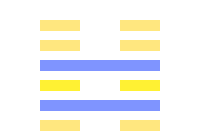
40.2.3.4 (40 > 15) - THE KIEH HEXAGRAM.
- 2. The second line, undivided, shows its subject catch, in hunting, three foxes, and obtain the yellow ( = golden) arrows. With firm correctness there will be good fortune.
- 3. The third line, divided, shows a porter with his burden, (yet) riding in a carriage. He will (only) tempt robbers to attack him. However firm and correct he may (try to) be, there will be cause for regret.
- 4. (To the subject of) the fourth line, undivided, (it is said), ‘Remove your toes. Friends will (then) come, between you and whom there will be mutual confidence.’
40.2.3.4 (40 > 15) - Stop quarreling
One can easily harmonize once a compromise has been found.
Bing DeepL Google Yandex40.2.3.4 (40 > 15) - Stop quarreling
One can easily harmonize once a compromise has been found.
Bing DeepL Google Yandex40.2.3.4 (40 > 15) - Kieh, la libération
Kieh : 1. Délivrer, faire échapper, échapper au danger ; 2. Disperser ; 3. Ouvrir, séparer, s’ouvrir. Se dit du mouvement de la germination. 4. Résoudre une difficulté, une complication.
- 2. Délivrer est aussi heureux que, pour le chasseur, prendre trois renards et obtenir le prix, la flèche d’or. — Celui qui résout une difficulté, fait sortir d’une position difficile, est comme le chasseur qui prend trois renards et obtient la flèche d’or.
-
3. Si un porteur se met dans un char et qu’il survienne des voleurs, il sera attaqué et échappera difficilement ; s’il abandonne sa charge, il pourra se sauver.
Pour un porteur, aller en char est honteux ; c’est attirer sur soi les voleurs.
Il n’appartient pas à des gens du commun d’aller en char . -
4. Échappez d’abord et après cela les amis viendront témoigner leur fidélité (sinon ils vous abandonnent).
Note. Le mot qui signifie ordinairement gros orteil est expliqué par les commentateurs comme ayant ici le sens de tchū, commencement, d’abord
40.2.3.4 (40 > 15) - Arrêter de se quereller
On peut harmoniser avec aisance une fois qu'un compromis a été trouvé.
Bing DeepL Google Yandex40.2.3.4 (40 > 15) - Módosítás
- 2. Megkérik hogy válaszokat keressen mielőtt túl késő.
- 3. Ha valaki elhanyagolja, másoknak adja.
- 4. Ajtók fognak megnyílni ha valaki felhagy a felesleges kényelemkereséssel.

